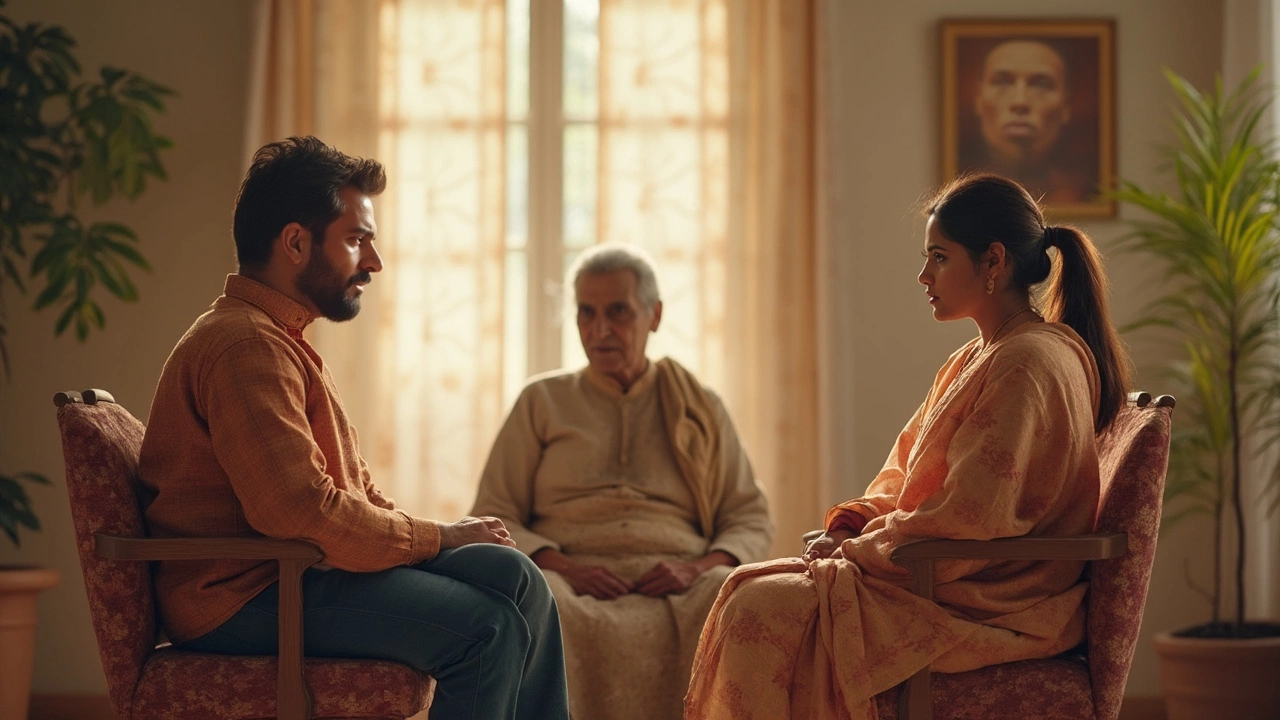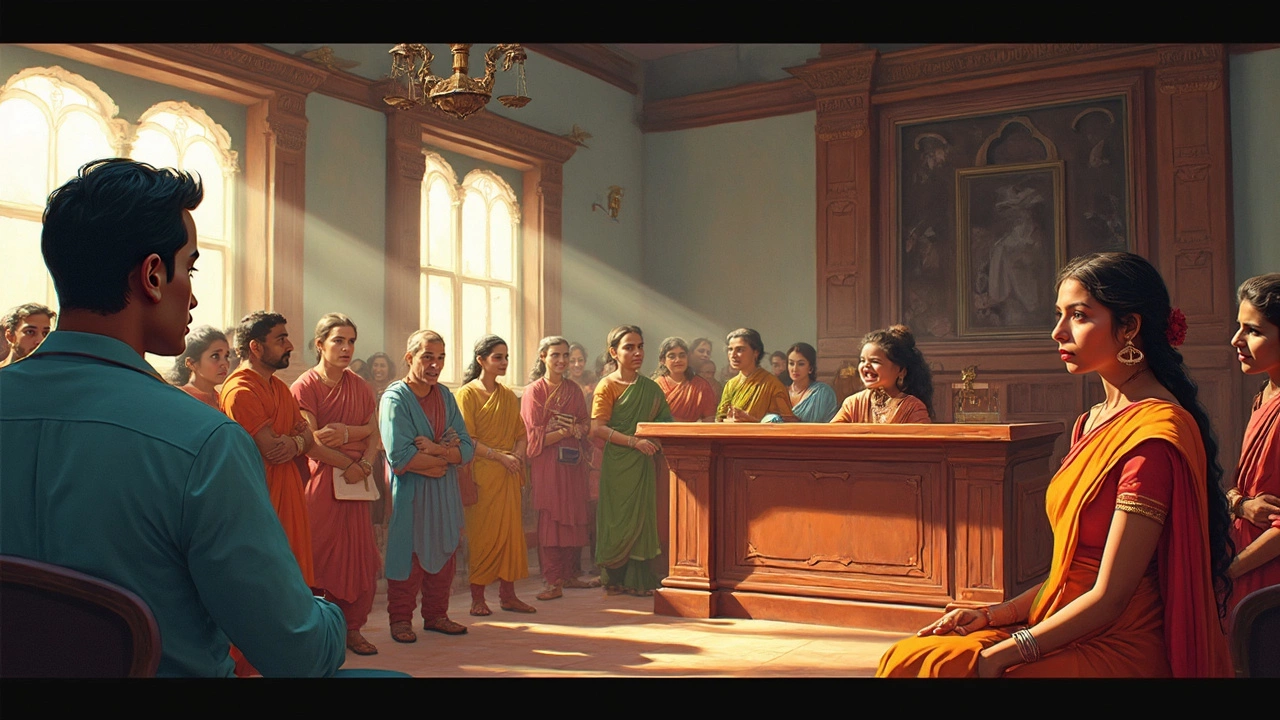Facing a situation where your husband refuses to grant a divorce in India can feel overwhelming. You're not alone, and understanding the legal landscape can help clear some of the fog. The first thing you should know is that, in India, both parties are generally required to consent to a mutual divorce. But what if that's not happening?
Well, you do have options. Indian law provides for contested divorces based on certain grounds like cruelty or desertion, to name a few. It's crucial to understand these grounds, as they form the backbone of any legal proceedings. You could also consider mediation as a viable path to finding common ground without the battle scars of a courtroom.
Heading to court as a last resort? It's important to know what that entails. Legal proceedings can be lengthy and draining, both emotionally and financially. But with the right guidance, you can navigate this challenging time more effectively.
- Understanding Indian Divorce Laws
- Legal Grounds for Divorce
- The Role of Mediation and Counseling
- What Happens When a Case Goes to Court
- Practical Tips and Considerations
Understanding Indian Divorce Laws
So, what's the deal with divorce in India and how does it impact you when one partner isn't on board? Let's break it down. Indian divorce laws come under personal laws, which means they differ based on religion. For instance, Hindus, Buddhists, Sikhs, and Jains are generally governed by the Hindu Marriage Act of 1955. Similarly, Muslims, Christians, and Parsis have their own set of personal laws.
If you're in a predicament where your husband denies the divorce, understanding the grounds on which you can file is critical. These grounds include adultery, cruelty, desertion, conversion to another religion, mental disorder, and communicable diseases, among others. Knowing these can help you determine what's applicable to your situation, especially if a mutual consent divorce isn't on the table.
Mutual Consent vs. Contested Divorce
Let's look at the two main types: mutual consent and contested divorce. Mutual consent is straightforward; both parties agree to the divorce terms, which is usually quicker and less stressful. For this, a minimum separation of one year is required before filing. But what if your spouse isn't game?
A contested divorce is when one party isn't consenting, and you may need to prove one or more of those grounds we just talked about. This process tends to be longer and could involve a series of hearings, and evidence presentations, making it crucial to have a solid case.
Legal Acts and Timeframe
The Hindu Marriage Act stipulates one year of marriage before initiating divorce proceedings unless there are extreme hardships. Once you file, expect some waiting time. A mutual consent divorce could take around 6 months to 1 year, whereas contested ones may stretch to several years due to the legal back-and-forth.
Table: Key Grounds for Contested Divorce
| Ground | Description |
|---|---|
| Cruelty | Physical or mental harm that's severe enough to make it difficult to continue the marriage. |
| Adultery | Voluntary sexual intercourse with a person other than your spouse. |
| Desertion | One spouse abandons the other for at least two years. |
By understanding these aspects of Indian family law, you can make informed decisions and figure out the best approach to resolve your situation with as little hassle as possible.
Legal Grounds for Divorce
In India, the process of getting a divorce isn't just about filing papers and parting ways; there are specific legal grounds that one needs to establish, especially when one party isn't on board. If your husband is denying the divorce, knowing these grounds can be crucial for a contested divorce.
Different Grounds Under the Hindu Marriage Act
The Hindu Marriage Act of 1955 lists several grounds for divorce. Here's a quick look at some of the most commonly used ones:
- Cruelty: If there's any kind of mental or physical cruelty that makes staying in the marriage unbearable, this can be a valid reason.
- Desertion: If one spouse has deserted the other for at least two years before the filing of the divorce, it can be considered desertion.
- Adultery: If a spouse engages in an extramarital affair, this can be a ground for divorce.
- Conversion: If one partner has converted to another religion, this can also be cited.
- Mental Disorder: If a spouse suffers from an incurable mental disorder making it unreasonable to expect duties of marriage to be fulfilled.
- Leprosy: In cases of incurable, communicable diseases like leprosy, a divorce can be sought.
- Not Heard of as Being Alive: If a spouse hasn't been heard of as being alive for seven years, they can be declared dead, enabling the other spouse to remarry.
Special Marriage Act Grounds
The Special Marriage Act, which governs marriages between people of different religions or those not marrying under traditional rites, also has similar grounds for divorce.
Interesting Tidbit
Did you know that according to a 2020 database on national divorces, more than 30% of contested divorce cases in India were successfully concluded on the ground of cruelty?
Each of these grounds has specific criteria that need to be met, and the burden of proof lies with the person filing for the divorce. Having a divorce lawyer India by your side can really help in articulating and gathering evidence for these claims effectively.
In contested cases, evidence plays a huge role. It's not just about claiming that these events have occurred, but proving them in court to the satisfaction of the presiding judge.

The Role of Mediation and Counseling
When your partner isn't budging on the divorce front, stepping into mediation might just be the game-changer you need. So, what exactly does this involve? Well, a mediator acts as a neutral third party to help you and your husband find common ground. While it may seem like a long shot, about 60% of contested divorce cases in some Indian regions have been resolved successfully through mediation.
The Mediation Process
Mediation sessions typically kick off by setting some ground rules. The goal is to create a safe space where both sides can air their concerns without clashing. A mediator will facilitate discussions to break down larger issues into manageable bits. Ultimately, the aim is to come up with a workable solution that both you and your husband can live with.
Mediation isn’t legally binding, which means either party can still opt for a court battle if things don't pan out. However, give mediation a fair shot; it’s often faster and less emotionally draining than going through litigation.
Counseling as a Supporting Tool
While mediation focuses on practical solutions, counseling can address emotional hurdles. Family or couples counseling is often suggested to help the couple understand each other's perspectives. It’s particularly helpful in cases involving children, where emotional well-being is paramount.
- Counseling sessions can be multifaceted, targeting not just conflict resolution but also personal healing.
- Trained counselors provide a roadmap for navigating complex emotions, which can ease the strain of the divorce process.
- Specific counseling programs exist for children within families undergoing divorce, emphasizing their well-being during these tumultuous times.
When to Seek Mediation and Counseling
If there’s a possibility of a mutual understanding, it’s worth exploring these options. Even if things seem bleak, mediation and counseling may offer new perspectives and ideas that you hadn't considered. Don’t rule it out just because emotions are running high; these resources are designed to handle exactly that.
The takeaway here? Divorce in India doesn't have to turn into an all-out courtroom brawl. Mediation and counseling provide viable alternatives that respect both the legal complexities and emotional layers involved.
What Happens When a Case Goes to Court
When a divorce case lands in court in India, it kicks off a formal legal process. It's not a simple affair, so being prepared can help you navigate it more smoothly. Let's break down what you can expect when you take this route.
Filing the Petition
The journey starts with filing a petition in the family court. If the husband denies divorce, the wife files a contested divorce petition. You'll need to cite specific legal grounds, like cruelty or desertion, as reasons for seeking the divorce.
Court Hearings
Once the petition is filed, both parties will get their days in court. Expect multiple hearings where evidence is presented. Courts will hear both sides, evaluate evidence, and call witnesses if necessary. It's a lengthy process, often taking months or years.
Interim Orders
During the proceedings, either party may request interim orders for temporary arrangements like child custody or maintenance.Indian family law courts focus on the well-being of children first, so any custody decisions prioritize their best interests.
Final Verdict
After all hearings, the court will issue a final verdict. If the court is satisfied with the evidence and the legal grounds are established, it may grant the divorce. If not, the petition could be dismissed.
Financial Implications
Going to court isn't cheap. Legal fees can add up, and contested divorces might require paying spousal support or settlement amounts.
Possible Outcomes
The outcomes vary. You may get a divorce or, in some cases, the court may suggest an alternative, like counseling or mediation, if it sees minor chances of reconciliation.
| Stage | Average Duration |
|---|---|
| Filing to First Hearing | 3-6 months |
| Active Court Hearings | 6-18 months |
| Final Verdict | 1 month |
Navigating the court isn't a walk in the park, but understanding the process helps in setting realistic expectations. Keep communicating with your divorce lawyer to stay informed and prepared at every step.

Practical Tips and Considerations
Navigating the choppy waters of divorce in India when the husband isn't agreeing can be challenging, but practical steps and considerations make it a bit smoother. Preparing ahead and knowing what to expect are key parts of the process.
Gather the Right Documentation
One of the first things you'll want to do is gather important documents. These include marriage certificates, proof of separation if applicable, evidence of any claims you're making (like messages or reports), and financial statements. These will be crucial if you need to file for a contested divorce.
Seeking Legal Advice
You don't have to go through this alone. A divorce lawyer in India with experience in your specific situation is invaluable. They can help you understand your rights and the best legal routes to take. It's important to shop around and find a lawyer who truly understands your case and with whom you feel comfortable.
Mental and Emotional Support
Divorce isn't just a legal process; it's emotional too. Surround yourself with supportive friends and family or consider talking to a therapist. Emotional well-being is crucial as you undergo this transition.
Exploring Mediation
Mediation can sometimes be a less aggressive way to resolve matters. A neutral third party helps facilitate dialogue between you and your spouse, ideally reaching a mutual agreement. This route can be less stressful and time-consuming than court battles.
Understanding the Timeline
Divorce proceedings can be lengthy. On average, a contested divorce in India might take anywhere from 18 to 24 months to settle—often longer. Patience and persistence are important, so being mentally prepared for the timeline can ease some of the anxiety.
Keep an Eye on Financial Stability
Divorce can take a financial toll, especially if proceedings drag on. Review your finances, make a budget, and plan for unexpected expenses as you go through the process. Ensuring financial stability can reduce a lot of stress in the long run.
Equip yourself with knowledge and support to tackle the situation proactively. While the journey may not be easy, taking practical steps ensures you're moving closer to resolution and a fresh start.
